Erstellt am: 23. 10. 2014 - 17:29 Uhr
Cycling As A Tool For Change
At breakfast at Mihnea Virgolici's farmhouse near Prod, in Transylvania, the talk at breakfast was about bears.
Prints had recently found unusually close to the village. The forests that descend to the fringes of the village are still teaming with wild animals and the dogs had barked fiercely at night to fend of the roaming wild boar.
Tuica, Scythes and Eggs of Hay
Rural Romania: a relic of the past? Or a beacon for a more balanced future.
"Apart from my little Momo," laughs Mihnea, "He howls because he is unhappily in love."
Who could blame Momo? It's a romantic place.
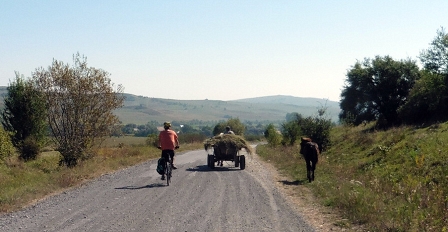
chris cummins
Prod, my starting base for 7 days of cycling through Romania, is a village colourfully painted one-story houses - a kaleidoscope of pastel blues, pistachios, ochres and ox-blood reds. At sunrise, you’ll meet men with long-handled scythes setting out to the fields. Cows take a last gulp at the village pond before being herded up the hills by a man with a huge rope whip that he cracks like a pistol. The countryside is bubbling with activity.
Ugandan Diary - A bike ride through Central Africa
I was riding with a young Romanian called Mircea Crisbasanu, who set up the guiding team Cycling Romania, after returning from his studies in Holland four years ago. He was determined to develop cycling as a way of aiding rural development and showing off the beauty of his own country - as much to his fellow Romanians as to foreign guests like me.
"When I got back from Holland everyone was moaning about Romania and saying that there is nothing here and that they wanted to leave."
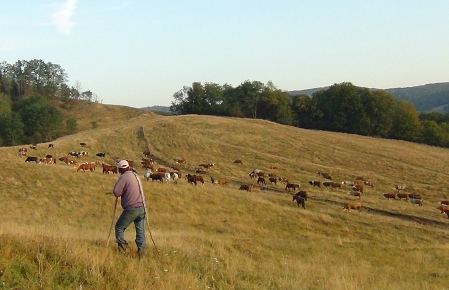
Chris Cummins
It’s a story I'd heard before in Romania. Mircea blames the media for highlighting the negative, creating an atmosphere of excessive doom and disillusionment among Romanians. "We don’t now what we have here. We need young talented people to stay and help develop this beautiful country. So in my own small way, I wanted to show them the other side of Romania."
Haunting
There's plenty to show. Forget the tired Dracula clichés, and the belief in the power of witches that is said to persist in the villages, the only thing truly haunting about Transylvania is this bucolic beauty. We rode through brown hills that were patched with dark mysterious forests, pointy castles and the ubiquitous pastel-shaded villages.
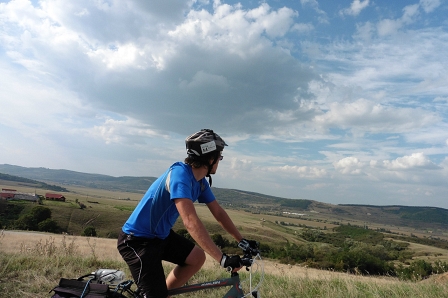
Chris Cummins
Recounting his journey through Transylvania in 1934 in the travel-writing classic "Between The Woods and the Water", Patrick Leigh Fermour writes. "For miles we met only cattle and a cart or two drawn by the sturdy local horses."
He thought he was writing of a vanishing world but 80 years on, the back lanes are scarcely more busy and the quiet, wild-flower strewn hillsides are dotted with the multicoloured hives of the nomadic beekeepers.
Bucharest is Blooming A city of hidden gems: How an undervalued city wants to shed its grey reputation.
Mostly we rode on fast gravel tracks, rain-washed forest trails or deserted country roads. But occasionally the riding exhilarating. Near the small village of Crit there is a section of white undulating single-trail besides a swampy river.
Empty Roads and Colourful Hives
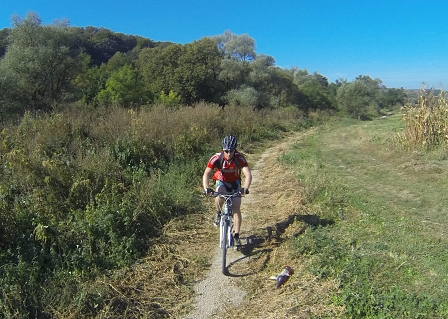
Mircea Crisbasanu
Everyone who returns from Romania speaks of enchantment and there was mystery in the Transylvanian woods.
On the first evening of riding we chanced upon a fortress of wood, made by charcoal burners who had laid a ring vertical logs forming an outer wall around a piled up keep. These are the secrets of a skilled trade that has disappeared in most parts of Western Europe. It was like stepping into a Thomas Hardy novel. As night approached, the burners were sipping tuica, the strong Romanian plum brandy, and watching over the blackened embers as chickens strutted around like proud camp guards.
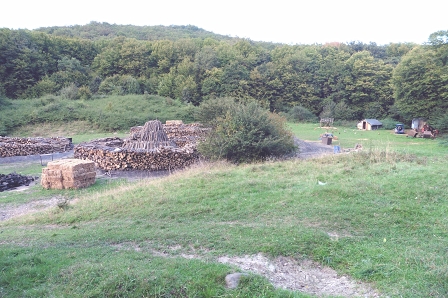
Chris Cummins
Leaving the woods, we descended a rocky forest path down to the next village. It was dusk but the wood smoke was rising like morning mist as we passed Roma-farmer riding back from their fields on horse drawn carts.
"The rhythm of cycling is perfect for discovering a country," says Mircea, "All your senses are working. You see, you hear you taste. And you talk to the local people, asking them for directions or where you can eat."
Adopted
It was the simple interaction that I cherished on this trip. In the past year, my home country Britain has invested significant energy in insulting and demonising Romanians, the simple dignity and kindness of the people I met in Transylvania filled me with shame for the xenophobic words of Farage and co.
Take Marioara for example, who I met in the village of Copsa Mare. We stopped for water, which she arduously wheeled up in a bucket from the well in her flower-covered courtyard. As we sipped the water, that was cold and fresh and invigorating, she offered to show us her "museum".
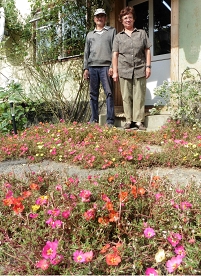
Chris Cummins
This turned out to be a shed full of implements left behind by the 'Saxons' who lived in Copsa Mare. There was an old weaving loom, some bread making apparatus, pots and pans, a frame to bake bricks for building and old woven cloths She'd never sold them, she explained, because "they belong in this village" and she won’t accept any money for visits
The Other Side Of Migration
Instead she loaded us with a giant chunk of lard, called slanina, and some onions "because you can’t eat slanina without red onions" and a bulging bag of yellow and red cherry tomatoes from her garden vegetable patch.
When we make a token to refuse her generous gifts she said: "I would have given these to our children, but they are not here."
This is the reverse story of migration. As we obsess about new arrivals in our labour markets, we rarely give a thought to the sadness of the split families left behind. Marioara’s children have moved abroad for work, a daughter is in Cologne and a son in Barcelona. She says she misses them dreadfully.
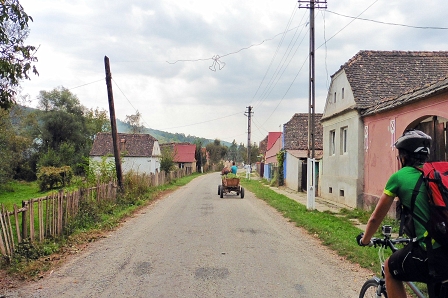
Chris Cummins
The absence of the orginal 'Saxons' is also keenly felt in Transylvania. The German-speaking Romanian minority who were encouraged to settle there in the 12th century by a Hungarian King called Geza II, who admired their frugal work effort and wanted them develop the land and defend the frontiers. They came from near Cologne and what is today Luxembourg to settled in Transylvania and remained for 800 years fortifying their churches with castle walls to keep the Tartars and later Turks at bay.
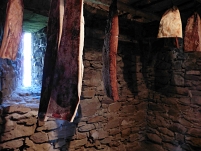
Chris Cummins
Bacon Towers
At Viscri, where Prince Charles has a house, there are massive chucks of salted ham in the "lard Tower.2 They were kept there once in case of a siege, and then later, marked by each householder, they still serve as storage space.
But the legs of ham are few now, and so are the Saxons. In 1930s there were 745,000 living voluntarily segregated lives, upholding traditional pious, industrious ways of life and refusing the intermarry into the broader Transylvania society with life changing only slowly with the passing centuries.
But the cataclysm of Second World War tore their communities apart. Many were deported to freezing Russian labour camps after Hitler’s defeat, usually merely on account of their ethnicity. The persecution continued when the exiles returned, depleted in number and haunted by their experiences on the Russian step. No wonder many became obsessed with leaving.
"They were a strong community and the communists feared strong communities," says Mircea.
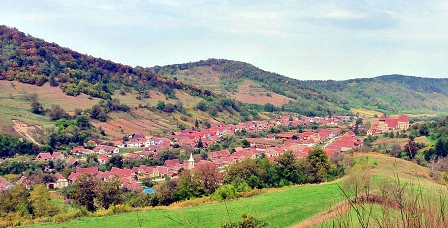
Chris Cummins
When Germany, which considered the Saxons Auslandsdeutsche, or "Germans abroad" waved visa restrictions invited them to resettle in the land of their distant ancestors after the fall of the Iron Curtain, most of them took up the offer and abandoned the communities they founded. By 2011 there were only 36,884 left in the whole of Romania In the summer many return, richer but homesick for their lost lives, coming back to villages now dominated by Roma.
The Much Maligned Roma
In the village of Viisoara, a quartet of Roma boys raced us on their bikes. Barebacked and sleek like otters after months in the Balkan sun, they made good speed, grinning and often riding with no hands, although one of them had deflated tyres and a buckled wheel.
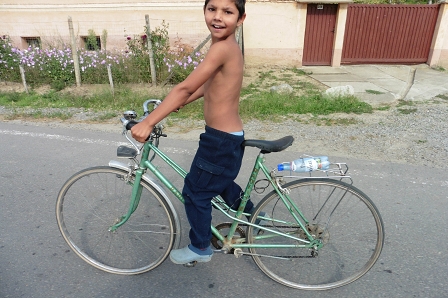
Chris Cummins
The Roma remain the poorest among Romanians and much maligned. Deliberately marginalized, they are then blamed for not fitting in. Treated with contempt at school, they are then blamed for leaving early.
But is Stejarisu, a village dominated by Roma, things are slowly looking up. Situated at the end of a long valley dotted with wildflowers, the village is dominated by one of the ubiquitous fortress-churches. Cows and buffalo wallow in the marshy village stream and elf-like children dance along the dirt and stone road. In the mornings, contrary to the cliché, these children fill the benches of the local school and there is a feeling of hope and renewal in Stejarisu.
Investment in cottage industries, such as the marketing of wild garlic and berries, and investment in tourism have helped people maintain their culture brought the unemployment rate down from 75% to 50%. That is still catastrophic but miracles don't happen overnight. What the Roma need is support and encouragement not distain and prejudice.
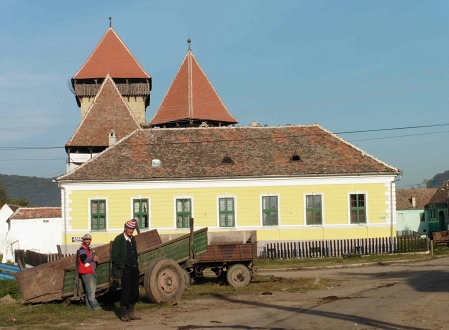
Chris Cummins
The Dawn Chorus
To say a final goodbye to this enchanted place, I trekked behind Mircea up a hill mountain the following dawn to watch the sunrise. In the early morning due we tramped past three separate graveyards. The historic segregation between the German-speaking Saxons, the Romanians and the Romani-speaking Roma had extended even to death.
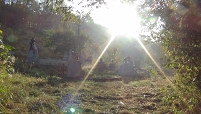
Chris Cummins
The hills above the village were already in chorus. A drover brought his mooing cows, some clanking with bells, past a goat-pen defended against wolves by fierce barking dogs. The goat-man shouted at his dogs, the drover cracked his whip, and, moments later, a second drover arrived with a group of fine looking horses, whinnying in indignation at the fierce dogs.
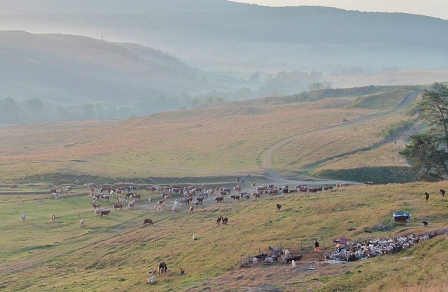
Chris Cummins
Entranced, I sipped coffee from a flask we’d brought up the slope, watching the sun creep above the hills and cast shallow light over the brown, tufted grass, illuminating the wrinkles folds on the country. With the warmth, the insects started singing. It was "son et luminiere" show in a country that was intensely alive. A world I thought, mistakenly, had been lost forever in Europe of mechanised industrialised farming.
Is it a vanishing world? Perhaps - but I hope that, while developing their rural backwaters, Romanians will realise that they possess a rare magic that should be treasured.


